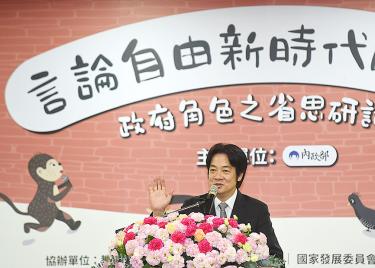Premier William Lai (賴清德) yesterday reiterated his position on Taiwanese independence and called on China to respect freedom of speech, as Beijing ramped up its rhetoric.
Democracy signifies freedom to express one’s opinion on the direction that the country’s development should take and to advocate Taiwanese independence if they wish to, Lai said.
Free speech is valued all over the world and should therefore be protected in China as well, the premier added.
The latest verbal sparring was prompted by Lai’s comment on Friday at the Legislative Yuan that he was a “Taiwan independence worker” and that Taiwan is a sovereign, independent country, sparking a call by the Chinese tabloid Global Times for his prosecution under China’s 2005 “Anti-Secession” Law.
“If evidence of his crimes are cast iron, then a global wanted notice can be issued for him,” the paper, published by the Chinese Communist Party’s official People’s Daily, wrote on Saturday.
China’s Taiwan Affairs Office weighed in late on Monday, saying Lai’s comments were “dangerous and presumptuous,” harming peace and stability across the Taiwan Strait, and that Taiwan would never be separated from China.
Lai yesterday stressed the importance of free speech at a forum organized by the Ministry of the Interior ahead of Freedom of Expression Day on Saturday.
“I absolutely am a ‘Taiwan independence worker,’” he said in Hoklo (commonly known as Taiwanese). “But it is out of respect for [late democracy pioneer] Deng Nan-jung (鄭南榕) that I do not say ‘I advocate Taiwanese independence.’ I am a follower, which is why I do this work.”
Lai said Chinese President Xi Jinping (習近平) took a cue from former president Chiang Kai-shek (蔣介石) in abolishing presidential term limits, and the abduction of Taiwanese democracy activist Lee Ming-che (李明哲) by Chinese authorities in March last year is evidence of the current state of Chinese society.
China now is like Taiwan during the Martial Law era when the Chinese Nationalist Party (KMT) held a monopoly on power, he said.
Separately, the Mainland Affairs Council said the Global Times’ and Chinese government’s comments were “intimidating and irrational.”
“Taiwan is a democratic, pluralistic society,” the council said, adding that Lai had consistently followed President Tsai Ing-wen’s (蔡英文) policy of maintaining peace and stability across the Taiwan Strait.
China “has repeatedly manipulated the media and so-called ‘Internet users’ to threaten and repress Taiwan’s government and people, trying to use military blows and legal threats to violate our dignity and interests,” the council said.
“This is not what a responsible party should be doing. It will only increase cross-strait antagonism and damage relations,” it added.
“Over the past two years, our government has not ‘felt animosity toward China,’” it said.
“But mainland China must face up to the reality of the separate governments on both sides of the Taiwan Strait and respect Taiwan’s democracy and the will of its people,” the council said.
Source: Taipei Times - 2018/04/04





















